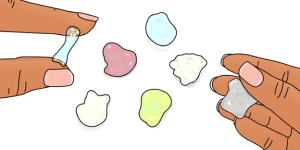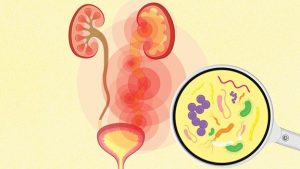Ever wonder what exactly your body needs to have a healthy menstrual cycle month after month?
If not, then you’re at the right place! Discover which nutrients are essential to support your cycle. If you’ve been experiencing irregular or painful periods, focusing on these nutrients could help get your cycle back to normal and reduce discomfort.
Are you ready to learn the top five essential nutrients your body and cycle need?

Are You Getting Enough Nutrients to Support Your Menstrual Health?
Are you getting enough nutrients to support your menstrual health? The foods you eat can have a big impact on your cycle and how you feel each month. Here are five essential nutrients every woman needs:
- Iron: Losing blood during your period depletes your iron stores. Aim for 18 mg a day from sources like red meat, poultry, fish, and legumes. An iron supplement can also help prevent deficiency.
- Omega-3 fatty acids: These healthy fats reduce inflammation in the body and support hormonal balance. Get 1,000 mg a day from fatty fish like salmon, chia seeds, flax seeds, and walnuts.
- Vitamin D: This important vitamin regulates estrogen and progesterone levels. Most women are deficient, so consider a supplement of 600 to 800 IU per day along with eating more fatty fish and egg yolks.
- Zinc: This mineral is essential for ovarian and uterine health and helps regulate your cycle. Oysters, beef, pumpkin seeds, cashews, and chickpeas are excellent sources. Aim for 8 to 11 mg per day.
- Magnesium: This mineral helps reduce PMS symptoms like cramps, bloating, and mood changes. Leafy greens, nuts, seeds, beans, avocados, and bananas can help you meet the recommended 310 to 320 mg per day.
Getting the right nutrients will help ensure you have a healthy menstrual cycle and feel your best all month long. Focus on a balanced diet with lots of whole foods, lean proteins, and healthy fats. And don’t forget to stay hydrated, get enough sleep, and exercise regularly for maximum benefit. Your body and hormones will thank you!
Key Nutrient #1: Iron – Why It’s Essential for Menstrual Health
Why is iron so important for your period? Iron helps your body make hemoglobin, the protein in red blood cells that carries oxygen from your lungs to the rest of your body. During your period, you lose blood and iron. If you don’t have enough iron in your diet, it can lead to anemia and fatigue.
To support healthy menstruation, aim for 18 mg of iron per day. The best sources of iron include:
- Red meat: 3 ounces of beef or lamb contains up to 6 mg of iron. Choose grass-fed, organic meats when possible.
- Seafood: Oysters, clams, and mussels contain 3-6 mg of iron per 3-ounce serving. Salmon and tuna also provide a good amount of iron.
- Beans and lentils: 1 cup of cooked beans contains 3-6 mg of iron. Lentils, chickpeas, and kidney beans are excellent options.
- Dark leafy greens: A cup of cooked spinach or Swiss chard has 3-4 mg of iron. Add greens to soups, stews, and smoothies.
- Iron-fortified foods: Many pieces of bread, cereals, and nut butter have iron added. Check the nutrition labels and choose options with at least 10-30% of the daily value for iron per serving.
- Consider a supplement: If you have heavy periods or follow a plant-based diet, an iron supplement may help prevent deficiency. Talk to your doctor about whether a supplement is right for you.
Getting enough iron and other key nutrients will help ensure you have an easier, healthier period each month. Focus on a balanced diet with plenty of whole foods, and you’ll be well on your way to better menstrual health.
Other Important Nutrients: Vitamin D, Omega-3s, Magnesium and Zinc
Other important nutrients for menstrual health include vitamin D, omega-3 fatty acids, magnesium, and zinc.
- Vitamin D helps regulate estrogen and progesterone, the hormones that control your menstrual cycle. Most people are deficient in the “sunshine vitamin,” so consider taking a supplement of 600 to 800 IU per day.
- Omega-3 fatty acids reduce inflammation in the body and promote hormone balance. Aim for 1,000 mg of fish oil three times per week, or add fatty fish like salmon, sardines, and anchovies to your diet.
- Magnesium helps relax muscles and ease cramps. It also helps your body produce progesterone. Most women need about 310 to 360 mg per day. Increase your magnesium intake by adding foods like spinach, Swiss chard, black beans, bananas, and yogurt. You can also take an Epsom salt bath or use a magnesium lotion or oil.
- Lastly, zinc contributes to your body’s production of estrogen and progesterone. Lack of zinc can lead to irregular or absent periods. The recommended daily intake for women is 8 to 9 mg. Eat more oysters, beef, pumpkin seeds, cashews, and chickpeas.
Making sure you get adequate amounts of these four nutrients will help support a healthy, balanced menstrual cycle and ease uncomfortable symptoms like cramps, bloating or irregular bleeding. Be sure to talk to your doctor before taking any supplements to determine the right doses for your needs.
So, there you have it, five essential nutrients to nourish your body and support a healthy menstrual cycle. Focus on eating a balanced diet with plenty of whole foods like leafy greens, fatty fish, beans, and high-quality protein sources.
And if needed, consider supplementing with a high-quality multivitamin or prenatal vitamin to fill in any gaps. Your body and your cycle will thank you. Remember, diet and nutrition have a huge impact on your reproductive health and beyond. Making sure you’re getting all the right nutrients will help keep you feeling your best not just during your period but all month long.
Lastly, make sure to choose the best pads for periods in Pakistan as your comfort companion during your period.







